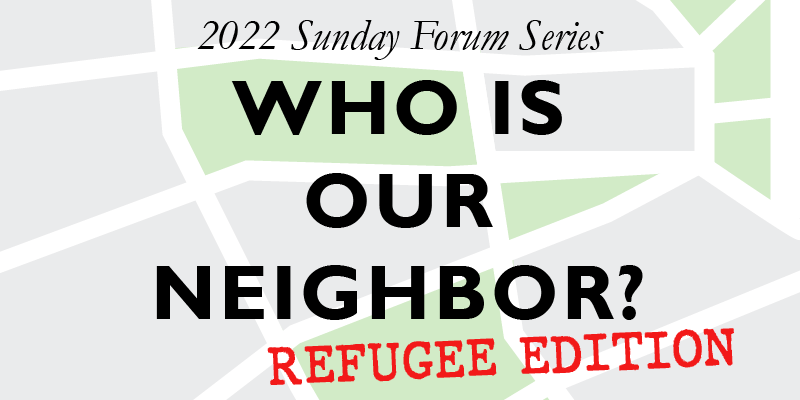
By parishioner Skip Moreland
This reflection was an outgrowth from the Who Is Our Neighbor: Refugee Edition Forum session called “Afghanistan and Faith” by parishioner Nathan Whaley. Click here to watch that Forum session.
A few weeks ago, Laurie+ and I were talking about military service, war, and Jesus Christ. Little did we know how timely that discussion was, given what is playing out on the world stage right now in Ukraine.
These are not easy topics of course, and I’ve been giving some thoughtful consideration to the subject, spending a fair amount of time in prayer, asking for guidance. (This reflection is) what I believe at this point in my life, as well as some explanation as to how I got to where I am. Understand, these ideas are largely coming out of my head and as such, please feel free to take what may be of some value to you, and discard the rest as the ramblings of an old man.
Now Cain said to his brother Abel, ‘Let’s go out to the field.’ And while they were in the field, Cain attacked his brother Abel and killed him.
Then the Lord said to Cain, ‘Where is your brother Abel?’. ‘I don’t know’, he replied. ‘Am I my brother’s keeper?’
The Lord said, ‘What have you done? Listen! Your brother’s blood cries out to me from the ground. Now you are under a curse….’
Genesis 4:8-10
I believe that we are our brother’s keepers. Every time a bullet flies and kills, another Cain is born in this world. That is why I had such a strong reaction to an assault rifle used in connection with the house of God, and also why I would probably not make a very good soldier.
Because we are our brother’s keepers, we are meant to take care of each other, especially those of us who are subjected to the forces of war. Should we not provide asylum and safe haven to refugees and those fleeing from oppression?
You have heard that it was said to the people long ago, ‘Do not murder, and anyone who murders will be subject to judgment.’ But I tell you that anyone who is angry with his brother will be subject to judgment.
Matthew 5:21-22
“Murder” or “kill” is one thing, but Jesus explains that this interpretation does not go far enough. Being angry with our brothers is enough for judgment. Before offering your gifts at the altar, you are to go and reconcile your anger with your brother.
Finally, be strong in the Lord and in his mighty power. Put on the full armor of God so that you can take your stand against the devil’s schemes. For our struggle is not against flesh and blood, but against the rulers, against the authorities, against the powers of this dark world and against the spiritual forces of evil in the heavenly realms.
Ephasians 6:10-12
Only God’s power is invincible. Our brothers are not the enemy and the battle cannot be won using human resources. The real enemy comes from unseen evil forces and can only be fought by putting on the “armor of God”.
Judgment is not ours to pass. Are we so righteous that we think we can decide between good and evil? When we say, “we are right” and “you are wrong”, are we are not playing God?
Now for some tough questions:
Is any war justifiable? What about when you are defending yourself, or your loved ones?
Tough question.
If someone were threatening me, my family, or my loved ones, I would probably use deadly force to defend us. On the other hand, I would probably not use deadly force to defend my property, my government, or my way of life. Like I said, probably not a very good soldier. And I would probably be wrong in Jesus’ eyes to defend even my family against evil.
Should we you support our veterans?
Not such a tough question.
We should support any and all Americans, not just veterans, who give of themselves, their time, their talents, and their lives for our country and our way of life. We are fortunate that we live in a place where we can speak freely, worship freely, and enjoy one of the highest standards of living in the world. Many Americans have paid the ultimate price for these freedoms.
I remember well the lessons of Viet Nam. I lost friends, neighbors and brothers in that war. Worse were the ones that returned. They came home to a country that abandoned them and made them feel ashamed for what they had done. They were not responsible for the evil forces behind the fighting, and yet they suffered the consequences at an intensely personal level.
What can we do?
Tough question – but we can actually do quite a bit.
We can put on the “armor of God”, and stand up for what we believe.
We can give time, talent and money to those who are the innocent victims of war.
Most importantly, we can pray. Pray that God changes the hearts and minds of humans consumed by the forces of evil. Pray that diplomacy can settle our differences. Pray that human life is spared. And pray that God’s peace, the peace that surpasses all understanding, infects the hearts and minds of all her children.
